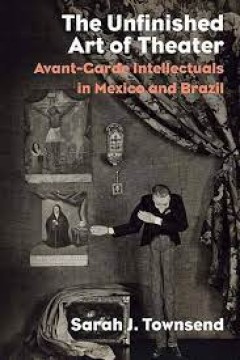Filter by
Found 1 from your keywords: author=SARAH, Townsend

The Unfinished Art of Theater Avant-Garde Intellectuals in Mexico and Brazil
The avant-garde posits the possibility of total rupture with the past. This book pulls back on this futuristic impulse by showing how theater became a key site for artists on the edge of capitalism to reconfigure the role of the aesthetic between 1917 and 1934. The book argues that this “unfinished art”—because of its weakness as a representative institution in Mexico and Brazil, where th…
- Edition
- -
- ISBN/ISSN
- 9780810137400
- Collation
- -
- Series Title
- -
- Call Number
- -
 Computer Science, Information & General Works
Computer Science, Information & General Works  Philosophy & Psychology
Philosophy & Psychology  Religion
Religion  Social Sciences
Social Sciences  Language
Language  Pure Science
Pure Science  Applied Sciences
Applied Sciences  Art & Recreation
Art & Recreation  Literature
Literature  History & Geography
History & Geography